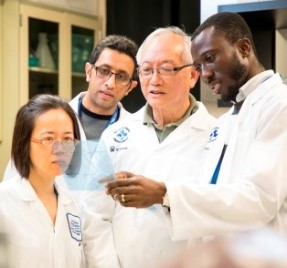 Researchers from The Ottawa Hospital and the University of Ottawa have been awarded $150,000 from the Canadian Cancer Society, the Canadian Institutes of Health Research and the Brain Canada Foundation to harness artificial intelligence and nanophotonics to fight ovarian cancer.
Researchers from The Ottawa Hospital and the University of Ottawa have been awarded $150,000 from the Canadian Cancer Society, the Canadian Institutes of Health Research and the Brain Canada Foundation to harness artificial intelligence and nanophotonics to fight ovarian cancer.
The project, led by Dr. Benjamin Tsang, will investigate if exosomes (nano-sized particles in the blood) can be used to detect early stage ovarian cancer and predict resistance to chemotherapy. Collaborators include Drs. Tien Le, Meshach Asare-Werehene, Hanan Anis, and Robert Hunter.
The multidisciplinary team will use state-of-the-art photonics, biological techniques and machine learning algorithms to differentiate between chemosensitive and chemoresistant ovarian cancer cells based on special features on their exosomes. Using blood samples from ovarian cancer patients, they will apply the same techniques to determine if exosomal differences can predict the stage of cancer and response to treatment. The researchers will also miniaturize their platform and explore its utility in clinical diagnosis.
This research could help with the development of individualized treatment strategies that minimize side-effects.
The funding was awarded through the Spark Grants Program focused on novel technology applications in cancer prevention and early detection.
The Ottawa Hospital is a leading academic health, research and learning hospital proudly affiliated with the University of Ottawa and supported by The Ottawa Hospital Foundation.
Media Contact
Jenn Ganton
613-614-5253
jganton@ohri.ca
